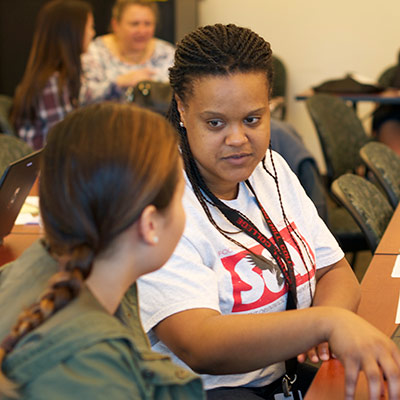| | |
Student Learning Outcomes - - Analyze the MBTI and Strong Interest Inventory results and apply those results to possible majors and careers.
- Using Career Exploration resources, understand the differences between the 16 career categories.
|
Description - |
| Explore career options compatible with student's strengths and interests. Using resources on the campus as well as on the Internet and in communities to investigate specific career choices, researching job descriptions, desired employee characteristics, training/education requirements, salary ranges and employment trends. |
Course Objectives - |
| The student will be able to:
- use resources on the campus, on the internet and in the community to gather information about chosen career fields and occupations.
- demonstrate critical thinking skills to assess eventual career goal.
- conduct informational interview(s).
- take assessment tests, either paper/pencil or online, to learn about student's interests, values, personality, skills and/or other aspects to assist in the research of appropriate careers/occupations.
- develop a plan to attain career goal including, but not limited to, selecting a college major and plan of study.
|
Special Facilities and/or Equipment - |
| - When taught on campus: access to internet (for online assessments).
- When taught on the Internet via Foothill Global Access: access to computer with internet and email access.
|
Course Content (Body of knowledge) - |
| - Self-assessment through use of vocational testing instruments:
- Explore interests, values, personality types and preferences by taking a minimum of two assessment inventories
- Critical assessment of instruments' results
- Use of results to explore at least three career fields and/or occupations
- Social and cultural conditioning influences on one's career choice
- Effects of sex role stereotyping, sexism, ageism, and other forms of discrimination on one's career aspirations and choices
- Understanding of gender equity, cultural diversity and future trends in the work force
- Use resources in the Campus Career Center, on the internet and in the community to investigate and research career information, including:
- Job descriptions of at least three possible careers or occupations
- Training or education required to enter career area
- Salary range of at least one career/occupation
- Career path and upward mobility potential
- Advantages and disadvantages of career/occupational choice(s)
- Action Plan will include:
- Integration and evaluation of all information gathered
- Identification of career/occupation choice(s)
- Short and long term goals including education/training required
- Description of decision process
|
Methods of Evaluation - |
| - Completion of all assignments
- Evidence of self-reflection and critical thinking in all homework
- Focus reduced to no more than two or three career/occupational goals
- Action plan defining information gathered and plans for activities needed to attain career goal(s)
|
Representative Text(s) - |
| - Representative Assessment instruments:
- CareerLink or similar assessment instrument
- Eureka Microskills IV or similar skills assessment instrument
- Optional instruments (fees charged for these instruments):
- Myers-Briggs Type Indicator
- Strong Interest Inventory and Skills Confidence for College Students
- Other online assessment instruments
- When taught via Foothill Global Access: supplemental lectures, reading materials, web based resources and assignments accessible on the internet. Class discussions and individualized attention will be delivered using online forums, messages and email
|
Disciplines - |
| Counseling
|
| |
Method of Instruction - |
| - Lecture presentations and classroom discussion using the language of theatre
- Reading weekly lesson modules
- Completing self-assessments of interests and aptitudes
- Completion of weekly assignments relating to career exploration
- In-class or online discussion and evaluation
|
| |
Lab Content - |
| Not applicable.
|
| |
Types and/or Examples of Required Reading, Writing and Outside of Class Assignments - |
| - Review module 6 on Networking: meet with someone in your career interest area (not a relative or close friend because that would be too subjective) and do an informational interview. There are plenty of questions that you can ask based on the lesson (and more from the Internet). Pick enough to do a 20 minute interview.
- Review Module 7 on career research: using various WWW search engines (Yahoo, Excite, Google, Magellin, etc.) locate at least 20 "good" websites related to your career choice. Visit as many sites as you have time for, that provide information about your career area. You may have to go through 100 sites just to get 20 marginal to excellent ones. Please try to avoid the typical Craig's List and Monster.Com. Go to professional organizations, trade journals. Try to come up with some fresh ideas and please plan to share them with the class. Share the 20 in the assignment area with brief summaries of why they are good, marginal, etc. From the 20, post the 10 best links in the Discussion forum with a one sentence summary for each so others may benefit from your research. Indicate why it might be useful or why it might be marginally useful.
|


